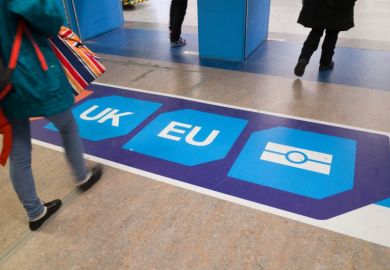A sector leader has warned that there is a real risk of UK universities’ “nightmare” Brexit fallout materialising, potentially excluding them from the world’s “scientific forefront over the next five to 50 years”.
Stuart Croft, vice-chancellor of the University of Warwick, told Times Higher Education that it was “extraordinary” that the UK was just “weeks away” from when it would have to settle its plans for leaving the European Union and still had possible “scenarios ranging from no-deal right the way through to possibly even some kind of Norway-style deal”. He added: “It makes it almost impossible to plan.”
The former professor of international relations said that it was “really depressing” that the worst-case outcomes for universities – for example, the UK’s exit from the EU’s research funding programmes and the collaborations they offer, or the absence of any arrangements for UK-EU mobility for staff and students – could not be ruled out.
“Those kinds of, almost, nightmare scenarios are really possible,” Professor Croft said.
He warned that these outcomes could have a devastating impact, explaining that academics “have to be part of international networks – that’s how you do research”.
“It is not the case that a UK disassociated from international networks is going to be at the scientific forefront over the course of the next five to 50 years. It is simply not going to be the case,” Professor Croft said.
EU students are also expected to be charged full fees in the UK – and possibly also lose their access to student loans – after Brexit. Some modelling has suggested that British universities will thus be able to increase their income from EU students even if numbers fall back significantly.
But Professor Croft stressed that the intellectual contribution of EU students at Warwick is “phenomenally high”.
“We have a series of programmes that, actually, we would have to question whether we’d continue with if significant numbers [of EU students] dropped off,” he added. “That kind of scenario [suggesting that EU student income could rise even if numbers fall] is really short-sighted and not one we’d welcome at all.”
Warwick’s response to the uncertainty of Brexit has been to form an alliance with European institutions, recently announcing that Slovenia’s University of Ljubljana would join the existing partners, the University of Paris-Seine and Vrije Universiteit Brussel.
There is potential for collaboration not just on research, but with “student mobility and joint student programmes – there are big opportunities there as well”, Professor Croft said.
Warwick has indicated that it hopes its network will be eligible to win funding as one of the European university networks first proposed by Emmanuel Macron, despite Brexit. The French president has proposed at least 20 designated “European” universities, forming networks of four to six institutions, in a bid to shore up European identity among the young.
One proposal is for each Macron network to focus on a grand challenge, such as in energy or health.
“If you’re going to solve the big problems of the world, you have to do that in an interdisciplinary way and at scale. And Britain isn’t big enough…to be able to do those sorts of things on our own,” Professor Croft said.
Register to continue
Why register?
- Registration is free and only takes a moment
- Once registered, you can read 3 articles a month
- Sign up for our newsletter
Subscribe
Or subscribe for unlimited access to:
- Unlimited access to news, views, insights & reviews
- Digital editions
- Digital access to THE’s university and college rankings analysis
Already registered or a current subscriber?








